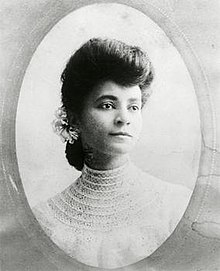Pauline Powell Burns was a pianist and a painter who was most well known for her early art exhibitions in California in the 1890s. Powell was born in Oakland, California in 1872, to Josephine Turner, a schoolteacher and domestic worker, and William W. Powell, a train porter. Her family and her ancestors history goes back to Monticello, and early U.S. President Thomas Jefferson.
Powell’s third great grandmother, Elizabeth Hemmings, was a part of the largest African American family to live at Jefferson’s home. Her great grandfather, Joseph Fossett, was a blacksmith, and her great grandmother, Edith was a domestic worker on the property, The couple and remaining family members were emancipated though Jefferson’s will in 1826. Her grandmother, Isabella, however, was sold away as a child as settlement for Jefferson’s debts.
Joseph and his family moved to Boston, where other members of the family eventually reunited, and migrated to Cincinnati, Ohio, due to the Fugitive Slave Act. After her grandmother Isabella’s death in 1872, Powell’s parents relocated to Oakland, where her father took a job as a Pullman Porter on the new transcontinental railroad.
Powell’s parents employment afforded her years of private schooling, focused in the arts; singing, piano, and painting. As a child prodigy, Powell gave numerous recitals in the San Francisco Bay area, sang in a quartet, and was hailed as a “bright musical star of her state.” She began showing her art at the young age of fourteen, and in 1890, when she was eighteen, a few of her pieces, including “Still Life With Fruits,” “Violets,” and “Champagne and Oysters,” were featured in her first public exhibition, at the Mechanics Institute Fair in San Francisco. This was the first time an African American artist was featured in California. Powell married Edward E. Burns on October 11, 1893. The couple had no children. She continued to paint and became a private piano teacher. Burns died of tuberculosis at the young age of 40, in 1912, in California.
Other oil on canvas paintings by Burns include “Bulldogs,” and “Untitled Still Life.” Curator Maurine St. Gaudens researched little known female artists for a decade, and searched for a year to find and acquire a work done by Burns that could be included in her 2019 showcase at the Pasadena Museum of History. Burns’ paintings are extremely scarce and considered rare, due to her death at such a young age. The largest known collection of Burns works is housed in the Dunsmuir House, in Oakland, California.
Burns painting, “Violets” was a part of the National Collection in the Smithsonian, but now resides in the Visual Arts Collection at the National Museum of African American History and Culture, in Washington, D.C.
Do you find this information helpful? A small donation would help us keep this available to all. Forego a bottle of soda and donate its cost to us for the information you just learned, and feel good about helping to make it available to everyone.
BlackPast.org is a 501(c)(3) non-profit and our EIN is 26-1625373. Your donation is fully tax-deductible.
Rebecca Weiss, “A Tale Of Two Women, Pioneering California Artists Pauline Powell Burns and Beulah Woodard,” Swanngalleries.com, January 16, 2014, https://www.swanngalleries.com/news/african-american-art/2014/01/california-artists-pauline-powell-burns-and-beulah-woodard/, Jean Sudbury, “Pasadena Museum of History Showcases “Lost” California Women Artists,” Coloradoboulevard.net, March 2, 2019, https://www.coloradoboulevard.net/lost-california-women-artists/

